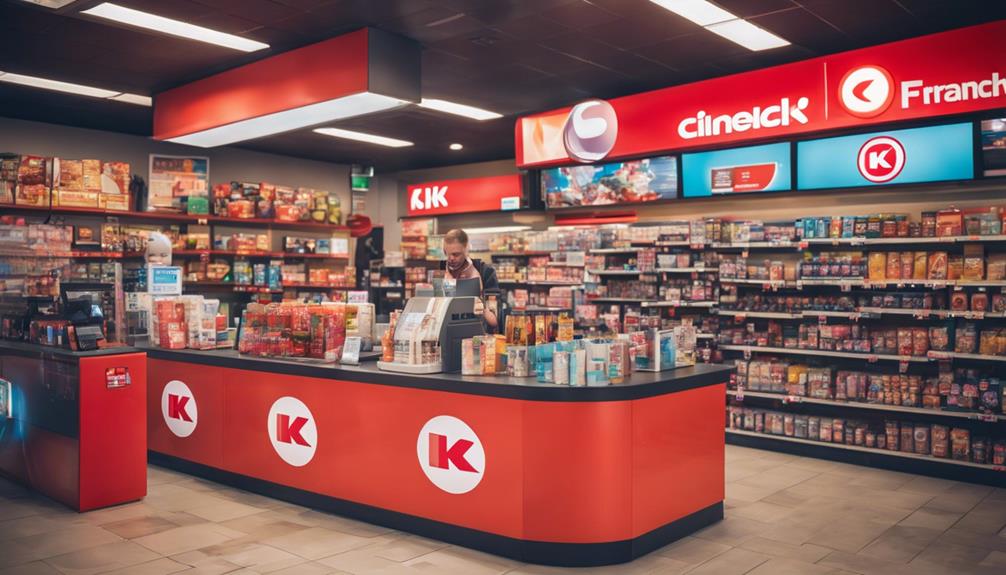To discover the perfect franchise opportunity, one must evaluate several key factors. Analyzing brand reputation and operational support is essential. Insight into financial requirements, including entry costs and ongoing fees, helps set realistic expectations. Understanding training and support available for franchisees guarantees long-term success. It's also important to take into account the competitive landscape and market dynamics. Each of these elements contributes to a sustainable business model that aligns individual goals with the franchise's vision. With the right approach, aspiring franchisees can identify options that meet their aspirations and objectives while uncovering new insights along the way.
Key Elements

In exploring the key elements of a franchise opportunity, understanding the company overview is essential for potential franchisees.
This includes a thorough look at the business model and operations, which provides insight into the franchise's viability.
Additionally, gathering information specifically tailored for franchisees helps clarify expectations and obligations within the franchise system.
Company Overview
A franchise company's success hinges on its brand reputation, operational support, and the quality of training it provides to franchisees.
A strong brand not only attracts customers but also instills confidence in potential franchisees. Effective operational support guarantees franchisees can navigate challenges smoothly, increasing their chances of success.
Thorough training programs equip franchisees with essential skills and knowledge, fostering consistent service across all locations. Additionally, a clear communication channel between franchisors and franchisees enhances collaboration and problem-solving.
Understanding these key elements allows prospective franchisees to evaluate opportunities critically, making sure they align with their goals and expectations.
Ultimately, a well-structured franchise company creates a solid foundation for sustainable growth and mutual success.
Business Overview
Key elements of a successful franchise business encompass brand strength, operational support, effective training, and strong communication between franchisors and franchisees.
A well-established brand attracts customers and builds trust, making it vital for franchise success.
Operational support guarantees franchisees can navigate challenges efficiently, while thorough training equips them with the skills needed to run their business effectively.
In addition, open communication fosters a collaborative environment, allowing franchisees to voice concerns and share insights.
This synergy not only enhances individual franchise performance but also strengthens the overall brand.
Information for Franchisees
Understanding the key elements that support franchisees helps them maximize their success within the franchise system.
Essential information includes a thorough review of the Franchise Disclosure Document (FDD), which outlines financial obligations, operational responsibilities, and legal rights.
Franchisees should evaluate their initial investment needs and ongoing fees, including royalties and advertising contributions.
Training and support from franchisors are vital; initial training programs and ongoing assistance enable franchisees to operate effectively.
Networking with fellow franchisees fosters community and shared insights.
Additionally, performance metrics provide benchmarks for evaluating business health and growth.
Company Overview

The company overview highlights the franchise's inception and key milestones that shaped its growth.
It also outlines the purpose and goals that drive the organization, along with insights into the executive team's backgrounds.
Additionally, understanding the competitive landscape helps potential franchisees gauge their positioning within the market.
Franchise Inception and Milestones
Franchises often begin with a visionary idea that evolves into a structured business model, paving the way for significant milestones in growth and expansion. Founders typically identify a market need and develop a unique concept that stands out.
As the brand gains traction, they establish operational guidelines and support systems for franchisees. Key milestones often include the first franchise opening, achieving a specific number of locations, and expanding into new markets.
Additionally, successful franchises frequently receive recognition through awards and rankings that validate their business model. Each milestone not only marks progress but also reinforces the franchise's credibility, attracting potential franchisees enthusiastic to join a proven system with a solid foundation.
Purpose and Goals
A franchise's purpose centers on empowering entrepreneurs to operate successful businesses under a recognized brand while achieving collective growth and sustainability.
This model fosters a supportive environment where franchisees can leverage established marketing strategies and operational efficiencies.
By aligning their personal goals with the franchise's mission, entrepreneurs can thrive in a competitive marketplace.
The overarching goal is to create a network of successful franchisees who contribute to the brand's reputation and profitability.
Franchisors prioritize innovation and adaptability, ensuring that franchisees have the tools necessary to meet changing consumer demands.
Ultimately, the purpose and goals of a franchise revolve around building a collaborative community that promotes shared success, stability, and long-term prosperity for all involved.
Executive Team Bios
Led by a diverse and experienced executive team, the company fosters a culture of innovation and collaboration to drive franchise success. Each member brings a unique set of skills and backgrounds, ensuring a well-rounded approach to leadership.
The CEO, with over two decades in the franchise sector, emphasizes strategic growth while prioritizing franchisee support. The CFO, known for financial acumen, manages resources effectively, enabling sustainable profitability.
Meanwhile, the Chief Marketing Officer focuses on brand development and market expansion, leveraging data-driven strategies to reach new audiences. Together, this team sets the vision and direction, empowering franchisees to thrive.
Their collective expertise and commitment to excellence create a strong foundation for franchise opportunities, ensuring each partner feels valued and supported.
Competitive Landscape Overview
Understanding the competitive landscape is essential for franchisees seeking to navigate market dynamics and capitalize on growth opportunities within their chosen industry.
An effective competitive analysis involves identifying key players, market share distribution, and emerging trends. Franchisees should assess both direct competitors and alternative business models that may impact their success.
Factors such as pricing strategies, product offerings, and customer experiences can notably influence market positioning. Additionally, staying informed about industry innovations and consumer preferences allows franchisees to adapt and thrive.
Brand Identity

Brand identity plays a vital role in a franchise's success by shaping consumer awareness and loyalty.
Franchisors focus on a customer-centric service philosophy, ensuring that their offerings resonate with target audiences.
With proven brand recognition, franchises can leverage their established identities to attract and retain customers effectively.
Consumer Awareness Levels
While traversing the franchise landscape, consumers often exhibit varying levels of awareness regarding the identities and reputations of different brands. This awareness can greatly influence their decision-making process.
Some consumers might be well-versed in well-established franchises, drawn by their strong branding and recognizable logos. Others may lack familiarity with newer or niche brands, relying on recommendations or online reviews to gauge credibility.
A brand's presence in marketing and social media plays an essential role in shaping perceptions. Over time, as consumers engage with brands, their awareness evolves, impacting their trust and loyalty.
Ultimately, understanding these awareness levels helps franchisors tailor their marketing strategies to reach potential franchisees effectively.
Customer-Centric Service Philosophy
A strong customer-centric service philosophy shapes a franchise's brand identity, fostering loyalty and trust among consumers. This approach prioritizes the needs and preferences of customers, ensuring they feel valued and understood.
Franchises that actively listen to feedback and adapt their services accordingly create lasting relationships with their clientele. By training employees to deliver consistent, high-quality service, brands can enhance customer satisfaction and promote repeat business.
Additionally, a focus on customer experience can differentiate a franchise from its competitors, making it more appealing to potential franchisees. Ultimately, a robust customer-centric service philosophy not only enhances a franchise's reputation but also drives long-term success, contributing to a positive and sustainable growth trajectory.
Proven Brand Recognition and Loyalty
Proven brand recognition often translates into customer loyalty, making franchises more attractive to potential investors and franchisees.
Established brands have built a reputation over time, fostering trust and familiarity among consumers. This loyalty not only drives repeat business but also attracts new customers, as people are often drawn to recognizable names.
Investors see value in franchises with strong brand identities because they often come with pre-existing customer bases, reducing marketing expenditures and ramp-up time.
Additionally, loyal customers are more likely to advocate for the brand, further enhancing its visibility and credibility.
Ultimately, a franchise's proven brand recognition creates a solid foundation for sustained growth and success in a competitive market.
Information for Franchisees

Franchisees benefit from a wealth of resources and support systems designed to secure their success in the competitive business landscape.
Most franchisors offer extensive initial training programs that equip franchisees with essential skills and knowledge. Ongoing support in operations, marketing, and management guarantees they stay competitive and informed.
Additionally, franchisees gain access to a vibrant community, allowing them to network and share experiences with fellow owners. Marketing resources including national advertising campaigns and localized tools help drive customer engagement.
Regular performance metrics and evaluations assist franchisees in measuring their business health, enabling them to make data-driven decisions.
Together, these elements create a robust framework for franchisees to thrive and achieve their business goals.
Financial Requirements & Ongoing Fees

When considering a franchise, understanding the financial requirements and ongoing fees is vital.
Franchisees face a range of costs, from one-time entry fees to ongoing percentages of gross sales and marketing contributions.
Additionally, technology maintenance fees can impact overall profitability, making it essential to evaluate these aspects thoroughly.
Startup Costs and Fees
Startup costs for franchises can greatly vary, often ranging from a few thousand to several million dollars, depending on the brand and industry.
These initial expenses typically include franchise fees, equipment, inventory, and real estate costs.
Franchisees should also budget for legal fees and initial marketing expenses to guarantee a successful launch.
Understanding ongoing fees is essential, as franchisees often face royalties, advertising contributions, and operational costs that can influence profitability.
These ongoing fees typically range from 4% to 10% of gross sales.
Franchisees need to assess their financial capacity carefully, as both startup and ongoing fees can markedly affect their overall business performance and sustainability in the long run.
One-Time Entry Cost
Understanding the one-time entry costs is vital for prospective franchisees, as these financial requirements set the stage for their investment and future operations.
Typically, these costs cover the franchise fee, initial inventory, equipment, and any necessary renovations. Franchise fees can vary greatly, ranging from a few thousand to several hundred thousand dollars, depending on the brand's reputation and market presence.
Additionally, new franchisees should consider costs associated with training and startup marketing. Being clear about these one-time expenses helps franchisees plan their finances effectively and guarantee they've enough capital to launch their business.
Ultimately, understanding these initial costs is essential for laying a solid foundation for long-term success in franchising.
Percentage of Gross Sales
Many franchisees find that a percentage of gross sales is a critical ongoing fee that impacts their overall profitability and financial planning. This fee, typically ranging from 4% to 8% of gross sales, is paid to the franchisor in exchange for brand support and operational guidance.
Franchisees need to factor this percentage into their budgeting to guarantee sustainable cash flow. Additionally, understanding how the fee structure works can help them anticipate fluctuations in costs during varying sales periods.
Properly managing these fees can greatly influence a franchisee's bottom line, making it essential for them to monitor sales closely and maintain efficient operations. Ultimately, traversing this financial requirement effectively can lead to greater success in the franchise business.
Marketing Contribution Percentage
In addition to the percentage of gross sales, franchisees often face a marketing contribution percentage that further impacts their financial commitments and ongoing fees.
This marketing contribution, typically calculated as a percentage of gross sales, funds national and regional advertising campaigns, helping to enhance brand visibility and attract customers.
While this fee can vary considerably between franchises, it's essential for prospective franchisees to understand how it affects their overall profitability.
Franchisees benefit from a collective marketing effort, but they must factor this expense into their budget.
Technology Maintenance Fees
How do technology maintenance fees impact a franchisee's financial landscape and ongoing operational costs?
These fees, which cover software updates, support services, and system upgrades, can greatly affect a franchisee's budget. Regular payments guarantee that the franchisee has access to the latest technology, enhancing operational efficiency and customer experience.
However, these fees can vary widely between franchises, often adding a substantial monthly or annual cost. Franchisees must account for these expenses alongside royalties and advertising contributions when evaluating overall profitability.
Failure to manage technology maintenance fees can lead to unexpected financial strain, underscoring the importance of thoroughly understanding all ongoing costs before committing to a franchise opportunity.
Consequently, careful financial planning is essential for long-term success.
Financing Options

When considering financing options, franchisees have several avenues to explore.
In-house funding solutions can provide immediate support, while alternative funding sources offer diverse choices.
Additionally, government-backed loan providers present a reliable option for securing the necessary capital.
In-House Funding Solutions
Exploring in-house funding solutions can provide franchisees with flexible financing options tailored to their specific needs.
Many franchisors offer in-house financing as a way to streamline the funding process, making it easier for franchisees to get started. This approach often includes lower interest rates and more favorable repayment terms, helping franchisees manage their financial commitments effectively.
Additionally, in-house financing can simplify the approval process, reducing the time it takes to secure funding. Franchisees gain access to capital without relying solely on external lenders, which can be especially beneficial for those with limited credit history.
Alternative Funding Sources Available
Franchisees can tap into various alternative funding sources to secure the necessary capital for their business ventures. Many opt for crowdfunding platforms, where they can present their franchise concept to potential investors in exchange for equity or rewards.
Peer-to-peer lending has also gained popularity, allowing franchisees to borrow directly from individuals, often at competitive rates. Additionally, some franchisees explore partnerships with local investors who share their vision, providing not only financial support but also valuable expertise.
Another option includes using credit cards for initial expenses, although this should be approached cautiously due to high-interest rates. By diversifying funding strategies, franchisees can bolster their chances of securing the capital they need for a successful launch.
Government-Backed Loan Providers
Government-backed loan providers offer franchisees access to favorable financing options, making it easier to secure the necessary capital for their business ventures.
These loans often come with lower interest rates and longer repayment terms, allowing franchisees to manage their cash flow more effectively.
The Small Business Administration (SBA) is a prominent source, offering various loan programs tailored for franchise operations.
Many franchisors even have established relationships with these lenders, streamlining the application process.
Additionally, government-backed loans typically require less collateral compared to traditional financing, making them more accessible for first-time franchisees.
Training & Support Offered

Franchisees receive extensive training and support to guarantee their success.
Detailed onboarding sessions kick off their journey, followed by regular skill enhancement workshops that keep them sharp.
Ongoing operational guidance sessions provide essential assistance as they navigate the day-to-day challenges of running their business.
Comprehensive Onboarding Sessions
Thorough onboarding sessions guarantee new franchise owners receive the essential training and support needed to successfully launch and operate their businesses.
These sessions typically cover vital aspects like operational procedures, customer service best practices, and financial management.
Franchisees engage in hands-on training, allowing them to familiarize themselves with the brand's systems and processes.
Additionally, new owners benefit from access to extensive training materials, including manuals and online resources.
This structured approach guarantees franchisees feel confident and well-prepared as they step into their roles.
Ongoing support during the onboarding phase fosters a sense of community, encouraging collaboration and networking among new franchise owners.
Ultimately, these extensive sessions lay a solid foundation for long-term success in the franchise industry.
Regular Skill Enhancement Workshops
Building on the solid foundation established during onboarding, regular skill enhancement workshops offer franchise owners ongoing opportunities to refine their abilities and stay updated on industry trends.
These workshops cover a range of relevant topics, from advanced marketing techniques to customer service excellence, ensuring that franchisees remain competitive in their markets.
Franchise owners can participate in interactive sessions, share best practices, and learn from industry experts.
With a focus on practical skills, these workshops empower franchisees to implement new strategies effectively.
By fostering a culture of continuous learning, franchisors help their franchisees enhance performance and drive business growth.
This commitment to skill development ultimately contributes to the overall success of the franchise network.
Ongoing Operational Guidance Sessions
Ongoing operational guidance sessions provide franchise owners with the tools and support necessary to navigate daily challenges and enhance their business operations effectively.
These sessions typically cover essential topics such as inventory management, customer service strategies, and financial tracking. By participating in these sessions, franchisees gain insights into best practices and industry trends, helping them to make informed decisions.
Additionally, franchisors often facilitate peer-to-peer networking opportunities, allowing franchise owners to exchange ideas and solutions. Regular feedback from experienced mentors further guides owners in optimizing their operations.
This ongoing support not only fosters individual franchise success but also contributes to the overall strength and reputation of the brand. Ultimately, these sessions empower franchisees to thrive in a competitive marketplace.
LEGAL AND REGULATORY

When considering a franchise opportunity, understanding key financial disclosures is essential.
These disclosures provide potential franchisees with critical information about initial investments, ongoing fees, and expected financial performance.
Key Financial Disclosures Required
Understanding the key financial disclosures is essential for potential franchisees.
They need to review specific sections of the Franchise Disclosure Document (FDD) to grasp their legal obligations and financial expectations.
This transparency guarantees that franchisees are well-informed before making significant investments.
Key Sections to Review
Reviewing key financial disclosures is essential for potential franchisees to guarantee they fully grasp the financial obligations and risks associated with the franchise opportunity.
This includes understanding the initial investment, ongoing fees, and profit margins.
Additionally, potential franchisees should examine any financial performance representations and historical data provided by the franchisor to make informed decisions about their investment.
Legal Obligations
Potential franchisees must familiarize themselves with key financial disclosures outlined in the Franchise Disclosure Document (FDD) to confirm they comprehend their legal obligations and financial commitments.
This includes understanding initial investment costs, ongoing fees, and any potential earnings claims.
MARKET ANALYSIS

The franchise market is witnessing significant growth in the technology sector, driven by increasing consumer reliance on digital solutions.
Millennial consumers, in particular, show a strong preference for tech-savvy brands that align with their lifestyle.
Understanding these trends is essential for potential franchisees looking to capitalize on emerging opportunities.
Franchise Growth in Technology Sector
The technology sector is experiencing significant franchise growth, with a forecasted increase of 15%.
This surge reflects the rising demand for tech services and solutions, creating new opportunities for aspiring franchisees.
As businesses seek innovative ways to adapt, the tech franchise market stands poised for expansion.
Franchise Growth in Tech Sector
Franchise growth in the technology sector has surged, driven by increasing demand for innovative solutions and digital services.
Entrepreneurs are capitalizing on this trend, launching franchises that focus on IT support, software development, and digital marketing.
The sector's adaptability fosters continuous expansion, attracting investors keen to tap into a market ripe with opportunities for technological advancement and consumer engagement.
Franchise Growth Forecast: 15% Increase
A 15% increase in franchise growth is anticipated in the technology sector, reflecting the rising demand for innovative digital solutions and services.
This surge indicates a shift in consumer preferences towards tech-driven offerings.
As businesses seek competitive advantages, franchises that adapt to these trends are likely to thrive, presenting lucrative opportunities for prospective franchisees looking to invest in a dynamic market.
Millennial Consumer Preferences
Millennials represent a significant force in the consumer market, influencing trends with their unique buying habits.
They prioritize experiences over possessions and often seek brands that align with their values, impacting their spending decisions.
Understanding these preferences is vital for franchises aiming to attract and retain this demographic.
Millennial Buying Habits
Shifting trends in consumer behavior reveal that millennials prioritize experiences, sustainability, and brand authenticity when making purchasing decisions.
They're more likely to support businesses that align with their values, particularly those that emphasize eco-friendly practices and community involvement.
Additionally, millennials seek personalized interactions and transparency from brands, making it essential for franchises to adapt their strategies to meet these evolving preferences effectively.
Consumer Spending Trends
Consumer spending trends reveal a growing preference for experiences over material goods, as younger generations increasingly prioritize meaningful interactions and sustainable practices in their purchasing decisions.
This shift impacts franchise opportunities, encouraging businesses that focus on experiential offerings, eco-friendly products, and community engagement.
Franchises that align with these values are likely to resonate more with millennial consumers, driving future growth and success.
EXIT STRATEGY

When considering an exit strategy, franchisees need to understand the dynamics of the resale market and the process involved in transferring ownership.
Successful exits often hinge on current market trends and the franchisor's policies regarding transfers.
Franchise Resale Market Trends
The franchise resale market is increasingly becoming a viable exit strategy for many franchisees looking to capitalize on their investments. As the demand for established franchises grows, current franchise owners are finding opportunities to sell their businesses for a profit.
Trends indicate that resale values are on the rise, driven by a robust economy and a favorable lending environment. Franchisees often benefit from the established brand recognition and customer base, which can make their businesses more attractive to potential buyers.
Additionally, sectors like food and beverage and health and wellness are seeing particularly strong resale activity. This trend highlights the importance of strategic planning, ensuring franchisees can maximize their returns when they decide to sell.
Franchise Transfer Process Guidelines
Maneuvering the franchise transfer process requires careful planning and adherence to specific guidelines to guarantee a smooth changeover. Franchisees must begin by reviewing their franchise agreement, which outlines transfer conditions, including any franchisor approval requirements.
Next, they should prepare a thorough sales package detailing the business's financial performance and operational history to attract potential buyers. Engaging a franchise consultant can provide valuable insights and assist in navigating the complexities of the process.
Additionally, potential buyers need to fulfill the franchisor's qualifications, ensuring they meet financial and operational criteria. Finally, both parties should consult legal professionals to finalize the transfer, ensuring compliance with all contractual obligations and local regulations.
Following these steps helps facilitate a successful franchise transfer.
ADDITIONAL RESOURCES

Franchisees often benefit from a variety of resources that address common questions and concerns.
They can access dedicated support hotlines for immediate assistance and engage in networking opportunities with fellow franchise owners.
These tools not only enhance their knowledge but also foster a sense of community within the franchise system.
Common Franchise Questions Answered
When considering a franchise, potential owners often have a variety of questions about the process, benefits, and responsibilities involved.
Many wonder how much initial investment is needed and what ongoing fees they should expect.
Others inquire about the support provided by franchisors and the training programs available for new franchisees.
Questions about the franchise agreement, including termination clauses and renewal options, are also common.
Additionally, prospective owners often seek clarity on how to assess the profitability of their franchise and the typical timeline for breaking even.
Addressing these concerns can help individuals make informed decisions, ensuring they choose the right franchise opportunity that aligns with their goals and expectations.
Franchise Support Hotline Details
For those seeking additional guidance, a franchise support hotline can provide valuable assistance and resources tailored to franchisee needs. This hotline typically offers on-demand support for various issues, ranging from operational challenges to marketing strategies. Franchisees can call in to ask questions and receive expert advice, ensuring they feel supported throughout their journey.
Additionally, many franchisors maintain a dedicated team to address concerns quickly, fostering a proactive approach to problem-solving. This resource is particularly helpful for new franchisees traversing unfamiliar territory.
Franchise Networking Opportunities
Networking events and online forums provide valuable opportunities for franchise owners to connect, share insights, and collaborate on best practices.
These platforms enable franchisees to build relationships with peers, gain industry knowledge, and discuss challenges they face in their businesses.
Many franchisors organize regional and national events, offering workshops, panel discussions, and informal meet-ups that foster networking.
Online forums and social media groups also serve as spaces for franchise owners to seek advice and share experiences, enhancing their operational strategies.
Conclusion
To summarize, finding the perfect franchise opportunity requires careful consideration and proactive engagement.
By understanding key elements such as brand identity, financial obligations, and legal requirements, aspiring franchisees can make informed decisions.
With thorough research and self-assessment, they can align their goals with the right franchise, ensuring a successful venture.
Ultimately, the journey into franchising can lead to rewarding outcomes, backed by the support of established brands and a community of fellow entrepreneurs.









